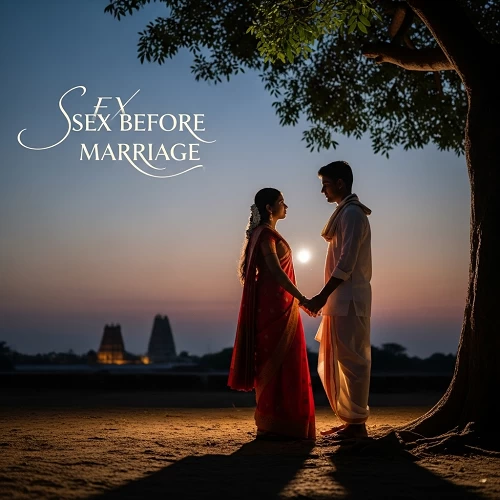Sex Before Marriage
Some instances from the texts on sexual intimacy before marriage

For the sake of Progeny
Satyavati and Parasara Muni
Satyavati was the daughter of the leader of fishermen, she used to row the boat across the river to help people. One day when Parasara muni was the only passenger, he expressed his desire to have sexual intercourse with her for the sake of giving birth to a great soul (Vyasa muni) to be born. She was shy and was afraid that the society would judge her and not treat well. However, the sage insisted that not only would she regain her virginity, the foul fish smell she had from birth would go away and she would smell of heavenly fragrance for her part in giving birth to Vyasa.
She eventually agreed, she conceived then and there and through the power of sage's tapasya the child was born within one day, and he grew up to be a young man right in front of them. Bowing down to his mother in gratitude, the young man assured assured her he'd be in her service when she needed him. She regained her virginity and went back to her family.
In the story, the society was shown as judgmental and unaccepting of the sexual intercourse, however the very givers of Dharma- Parasara and Vyasa were in full alignment with it.
Sharmishta and Yayati
Sharmishta, the daughter of Daitya king Vrishaparvan and Daitya Guru Shukracharya were close friends until a bitter fallout. when Shukracharya grew reluctant because of their daughters' feud, Vrishaparvan gave his daughter Sharmishta as servant to Shukracharya and his daughter Devayani, so that the Asuras had Shukracharya's favor.
Eventually Devayani married Yayati. Sharmishta followed her as a servant. Sharmishta though a servant, was still a radiant, intelligent personality. Through her wit she grew close to king Yayati, she pleaded with him in private, now that her friend Devayani has a child, Sharmishta also should have a child, otherwise she would die old without any progeny to save her father's lineage. She convinced him that it was according to Dharma to help a woman desiring to have children, surely her charmful wits and beauty helped convince Yayati. Through Yayati she conceived Puru.
Though Sharmishta wasn't married to Yayati, her bearing child outside wedlock was accepted, partly because Asuras had different law. Puru eventually went on to become the successor to Yayati, he is the ancestor to Kurus and Pandavas.
Obedience to Father
Madhavi- daughter of Yayati
Galava, a disciple of Vishwamitra was pestering him to ask for Guru Dakshina, irritated by his regular pestering, Vishwamitra asked for 800 white horses with one ear, as it was an impossible task. Galava sought help of King Yayati, the richest king of that time, even he was unable to fulfill his task, he offered his daughter Madhavi- an extraordinary woman in all ways, stunningly beautiful, a warrior trained in fighting, a tapasvi by nature, and wise beyond years.
She offered to help him, she had a boon, whenever she would give birth to a child, she would regain her virginity. She offered to help Galava. She offered to mother a son to king Haryashva of Ayodhya in exchange for 200 white horses, in time she bore him a son named Vasumanas. She repeated the same process with King Divodasa of Kashi, who received a son named Pratardana, King Aushinara of the Bhojas, who receives a son named Shibi. With six hundred horses collected, on Garuda 's suggestion Galava offerered 600 horse along with Madhavi to Vishvamitra. Who agreed to accept them in exchange for 800 horses and received a son named Ashtaka.
She later rejected every king that attended the swayamvara organized by her brothers for her, and became an ascetic who lived in the forests wandering with the deers.
Love
Dusyanta and Shakuntala
Dusyanta fell in Love with Shakuntala, when he was on a hunting trip in the forest. They fell in love with each other and conceived Bharata. Though they did not have a formal wedding ceremony. According to the Gandharva law, falling in love with each other and acceptance of each other as a complete partneris a marriage in itself- Gandharva Vivaha. So technically one could argue that they were married, though there were no other witnesses. Gandharva marriage is allowed for Kshatriyas.